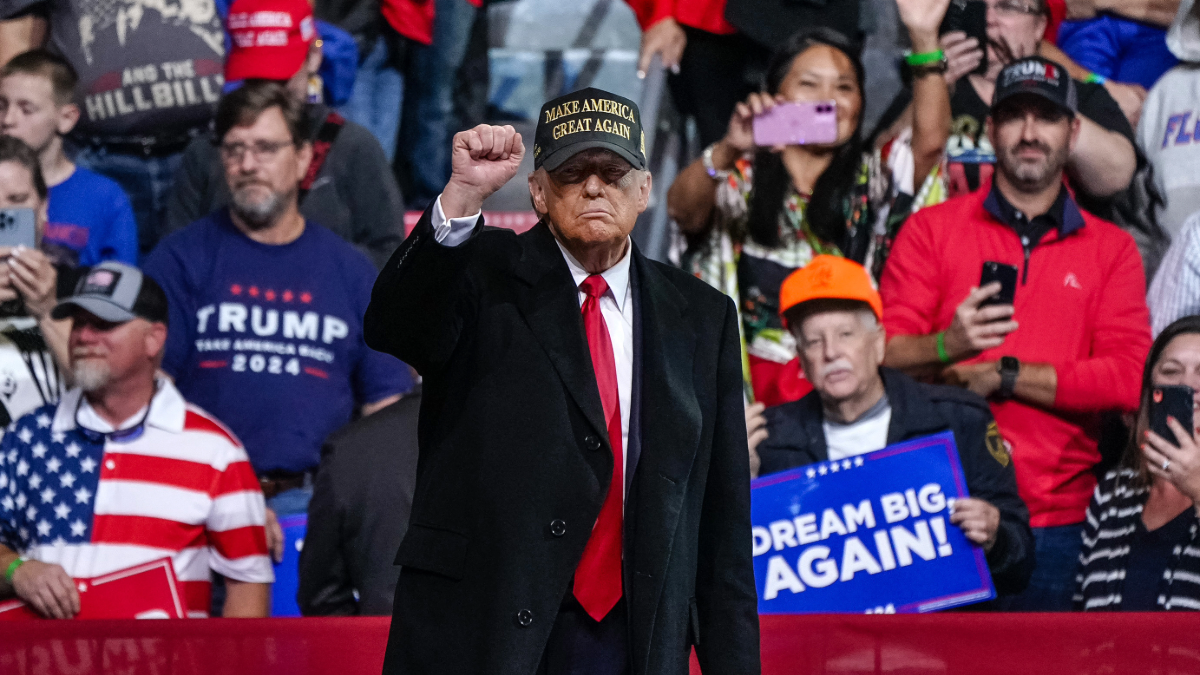Silicon Valley’s Embrace of National Security Will be All-Encompassing Under Trump
Brian J. Chen / Nov 22, 2024
Macon, Georgia - November 3, 2024: Former US President and then-Republican presidential candidate Donald Trump pumps his fist after speaking at the end of a campaign rally at Atrium Health Amphitheater in Macon. (Photo by ELIJAH NOUVELAGE/AFP via Getty Images)
Come inauguration day, President-elect Donald Trump will inherit a techno-security architecture primed to militarize new technologies, jettison AI protections, fast-track fossil fuel drilling, and champion the concentrated power of America’s tech oligarchy.
Those objectives, for the most part, look very different from President Joe Biden’s technology record. Yet the Biden administration’s accomplishments were always underwritten by a security pledge to eclipse China. For the US to “win the competition for the 21st century,” advanced technologies like AI could not be left to unsteady global production lines. Instead, the federal government would reconfigure its tech sector for US geopolitical advantage.
That leverage of great power competition, underpinning the president’s military Keynesianism, has transformed Washington. As Biden departs the nation’s highest office, he leaves behind a species of economic nationalism inseparable from high-tech innovation.
With a hawkish GOP administration, Big Tech firms and venture capitalists are well positioned to exploit the techno-nationalist mood. During the campaign, Silicon Valley figures like Elon Musk and Marc Andreessen helped shape the President-elect’s tech policy agenda. To “take the lead over China” on AI, campaign allies said the new administration will discard Biden’s AI guardrails and go full steam ahead on autonomous weapons, intelligence, and cybersecurity. To meet the vast energy demands of data centers, Trump has called for a boom in fossil fuel production.
Over the last four years, the Biden administration juggled three technology priorities: advancing safeguards to mitigate AI’s harms to people; taking enforcement actions against deceptive and anticompetitive behavior; and furthering an industrial strategy secured through China anxiety. President-elect Trump is certain to abandon the first two, empowering a tech industry that appears increasingly authoritarian. Yet, on the third policy pillar—federal spending to beat Beijing—Trump may find that he owes his predecessor a word of thanks. Just as Obama-era rule reforms greased the wheels for Trump’s first cabinet, the outgoing administration helped produce a security climate that will cost Trump little political capital to funnel funds toward the most dangerous and surveillant applications of AI.
Indeed, as Build Back Better flamed out, senior Biden officials borrowed a Trump innovation—refashioning great power competition as an immediate military threat—and applied it in far corners of domestic policy. The CHIPS and Science Act, for instance, the landmark $52.7 billion bill to revive semiconductor fabrication, was only made possible by invoking competition with China and stoking concerns over Taiwan’s troubled spot in global supply chains. Defense contractors enthusiastically supported the bill.
As “national security” directed subsidies to chip giants, it also was used as a rhetorical cover to evade protections against tech-driven harms. An executive memo regulating the government’s use of AI in national security systems, released shortly before the election, is riddled with carveouts and weak oversight. That means that agencies in charge of some of the most impactful government decisions, like selecting who gets put on a watchlist, enjoy near-unilateral discretion to deploy AI, facial recognition, and other invasive technologies. In the next Trump administration, the government’s unrestrained use of technology—perhaps to identify individuals to round up—is even more concerning.
That memo, and the rest of Biden’s AI executive actions, are sure to be undone as Trump charts a much different path on tech. But the throughline between the two presidents is a China consensus compatible with Democrats and Republicans alike, accommodating both liberal internationalism and “America First” foreign policy.
Given the turbulent state of the world, national security narratives are unlikely to recede. In Congress, expect lawmakers on both sides of the aisle to shoehorn tech competition with China into tech and defense bills. Silicon Valley is also getting in on the Pax Americana act. After all, grand narratives of us-versus-them support the bottom line, too. OpenAI CEO Sam Altman has boasted that “democratic AI has a lead over authoritarian AI because our political system has empowered US companies, entrepreneurs, and academics to research, innovate, and build.” We can expect such actors will continue to cloud the abuses of their products—from the abysmal working conditions of data workers to the climate damage wrought by data centers—by legitimating an assumed tech competition between the US and its rivals. The jingoism only gets louder in MAGA world.
After ridiculing “Bidenomics” during the campaign, President-elect Trump will return to a Washington changed by Biden’s “national security synthesis.” The administration bet that anti-China posturing would create jobs and unshackle domestic spending. That bet, whatever its long-term impact, failed with voters. Meantime, the president’s Cold War liberalism so inflamed the AI arms race that Washington can no longer entertain alternative theories of security.
To conjoin Silicon Valley profits with the war machine, Trump now inherits a national security base that gets the last word on tech policy. However real China’s threat to the US, the tired politics of techno-supremacy demands a different vision of what to do with American state power.
Related reading:
Authors
